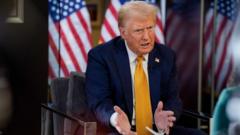Trump's plan to end birthright citizenship, a right enshrined in the U.S. Constitution, has raised eyebrows given the potential legal challenges it may face. The president-elect claims this policy is necessary to address perceived flaws in the current immigration system and aims to do so through executive action. However, experts warn that such moves could be immediately contested in court, highlighting the complex nature of amending constitutional rights.
Additionally, Trump expressed intentions to pardon participants of the January 6 Capitol insurrection—an act that he believes will rectify injustices faced by those jailed as a result of their involvement in the riot. "We're going to look at independent cases... I'll be acting very quickly," he stated, emphasizing urgency on his proposed pardons.
The interview also uncovered Trump's viewpoint on immigration policies, indicating that the deportation of undocumented immigrants, including parents of U.S. citizen children, would continue under his administration. However, he indicated a willingness to collaborate with Democrats regarding protections for "Dreamers," undocumented immigrants brought to the U.S. as children under the Deferred Action for Childhood Arrivals (DACA) program.
In terms of foreign relations, Trump hinted at a possible reevaluation of U.S. involvement in NATO depending on financial contributions from allied nations. He also signaled a decrease in support for Ukraine but maintained his stance on Social Security, assuring voters that he would not cut benefits.
Trump's comments have reignited debates surrounding the constitutional implications of his proposals and his controversial stance on various issues, leaving many eager to see how these plans will unfold once he takes office.
With an eye toward immediate reforms and executive actions, the upcoming term promises to be a pivotal one for Trump's presidency and could reshape U.S. policies significantly.
Additionally, Trump expressed intentions to pardon participants of the January 6 Capitol insurrection—an act that he believes will rectify injustices faced by those jailed as a result of their involvement in the riot. "We're going to look at independent cases... I'll be acting very quickly," he stated, emphasizing urgency on his proposed pardons.
The interview also uncovered Trump's viewpoint on immigration policies, indicating that the deportation of undocumented immigrants, including parents of U.S. citizen children, would continue under his administration. However, he indicated a willingness to collaborate with Democrats regarding protections for "Dreamers," undocumented immigrants brought to the U.S. as children under the Deferred Action for Childhood Arrivals (DACA) program.
In terms of foreign relations, Trump hinted at a possible reevaluation of U.S. involvement in NATO depending on financial contributions from allied nations. He also signaled a decrease in support for Ukraine but maintained his stance on Social Security, assuring voters that he would not cut benefits.
Trump's comments have reignited debates surrounding the constitutional implications of his proposals and his controversial stance on various issues, leaving many eager to see how these plans will unfold once he takes office.
With an eye toward immediate reforms and executive actions, the upcoming term promises to be a pivotal one for Trump's presidency and could reshape U.S. policies significantly.



















